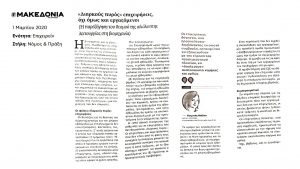Businesses may continuously operate, but Employees cannot: The misunderstanding around the institution of industrial enterprises that may continuously operate
I. Preamble
Recent public statements by the government regarding the operation of businesses for seven days a week have kicked off a relevant public debate. It seems that on the one side are the defenders of the liberal market, while on the other the defenders of labor rights. The latter are of the opinion that such arrangements violate acquired rights. Although it is an undisputed fact (see the inactivation of Collective Agreements) that labor rights shrank during the decade of the Greek crisis, this institution is not one such example. Its essentially was first introduced with a presidential decree issued during the 1932 Government of Eleftherios Venizelos.
It is valuable to form an opinion on the subject so that we can clearly understand and distinguish the concept of “work” from the concept of “continuous operation”. Also, to objectively assess the value of this measure for both the employer and the employee, in the present social and economic circumstances.
II. The legislative provision for the nature of “continuous operation” enterprises
Article 2 of Presidential Decree 27.6 / 4.7.1932 codifies the provisions regulating working time limits. Employees of industrial and craft undertakings shall not, under this provision, work for more than eight hours per day and forty-eight hours per week. Article 1 §2 of the same regulation states that factories or parts of factories are classify as “continuous operation” if the daily working time of the employees exceeds ten (10) hours.
III. The rotating employees shift system
In businesses which are by default continuous operation businesses, the staff works in rotating shifts. This is in order to ensure the continued operation of the business throughout the seven-day or six-day week. The continuous operation of a business requires a differentiated modus operandi and entails changes in the timing and manner of work of the employees of the business. Employees have a say in whether or not they participate in working conditions that suddenly (and beyond the original agreement) go beyond what is common. Specific rules were laid down by law, to limit the unpleasant consequences and burden of this type of work (especially of the work offered at night) on the life of the employees.
IV. Balancing overtime and the special circumstances.
1. Average working hours in more weeks
The eight-hour working hours per day limit, applicable to each employee, may be exceeded as long as the working hours are not more than fifty-six (56) per week. And that is, provided that the average working hours of the weekly working time do not exceed forty (40) hours per week on average, calculated in eight (8) weeks. Subsequently, overtime for employees under this scheme is calculated by offsetting the working hours throughout the eight-week period.
2. Provision for night employees shift
In addition, provision should be made, so that employees covering night shifts for one week will cover day shifts the following week.
3. Provision for weekly holidays
Finally, it is necessary to ensure: (a) that employees who work on Sundays are required to rest on another day of the week, and (b) that once every three weeks it is mandatory that the employees will have Sunday as a rest day, along with the preceding or following day.
V. Conditional extension of the regulation to undertakings not considered to be of “continuous operation”
1. The rotating working groups (shifts)
According to Article 7 of the Presidential Decree 27.6 / 4.7.1932, when it comes to employees working in shifts, the working hours may be extended to exceed eight hours a day and forty-eight hours per week on average, calculated in three weeks. The weekly average should not exceed 8 hours per day and 48 hours per week.
2. Continuous operation of the whole business or of parts of it, in businesses not considered to be of “continuous operation” by default
Pursuant to article 40 of Law 1892/1990, businesses and holdings which are not by their nature continuous, may operate continuously in whole or in part, with a system of alternating working groups. Necessary conditions: (a) the consent of the employee working in shifts and (b) compliance with all the above-mentioned conditions.
3. The extra employees shift of the weekend
Undertakings which are not of “continuous operation” by default, may, if necessary, operate as a whole (or in part) continuously over the weekend as well, even if its employees are not consenting to the business operating seven days a week.
In this case, the employer will be required to employ a new, independent group of employees, which will work two additional days a week. Specifically, the additional staff “weekend team” will work twelve hours each day of the weekend, during a given weekend. The remuneration of this group of staff for these twenty-four hours is equal to the remuneration of employees for a forty hour – five-day week. Of course, the exceptional days for that particular, additional, staff are not counted as such.
The above is also clarified in Opinion 97/2009 of the State Legal Council, which states that even if there is a Collective Agreement in place that provides for a five-day workday for employees of a particular specialty, it does not contravene the provisions of article 40 of Law 1892 / 11990. This is because a five-day week in no way negates or at least affects the possibility of six-day or even seven-day operation, with the creation of the fourth employees shift.
VI. In conclusion
By combining the above provisions, we realize that companies whose character justifies their continued operation or are in need to extend their operations partially or even in whole, can operate with shifts. In particular, subject to the conditions of employment protection provided for by law, companies licensed by the relevant Labor Inspectorate, and with appropriate legal advice to familiarize with the provisions and formulate and apply the right rules, can operate with shifts.
As a result, it is possible, under legal and legitimate conditions, for a company to “work” twenty-four hours a day and seven days a week with its employees working eight hours a day and five days a week!
Petrini Naidou
Senior Associate
P.S. A brief version of this article has been published in Greek in MAKEDONIA Newspaper (March 1, 2020).

Disclaimer: the information provided in this article is not (and is not intended to) constitute legal advice. Legal advice can only be offered by a competent attorney and after the latter takes into consideration all the relevant to your case data that you will provide them with. See here for more details.

